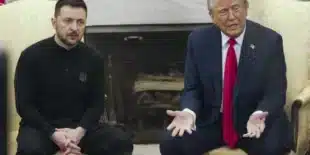World leaders have expressed strong support for Ukraine’s independence and territorial integrity and acknowledged the need for eventual negotiations with Russia to end the war. However, they left the specifics of how and when these talks should occur unresolved.
Over two years after Russia’s invasion, leaders and top officials from more than 90 countries gathered at a Swiss mountainside resort for a two-day summit focused on resolving the largest European conflict since World War II.
Ukrainian President Volodymyr Zelensky praised the diplomatic “success” of the event, which excluded Russia. He noted the possibility of a second peace summit aimed at achieving a fair and lasting settlement to the war.
“Russia and their leadership are not ready for a just peace,” Zelensky stated at the closing press conference. “Russia can start negotiations with us even tomorrow without waiting for anything — if they leave our legal territories.”
Meanwhile, Moscow reiterated its demand for Kyiv’s effective surrender as a precondition for negotiations.
– Challenging Path Ahead –
The summit’s final communique, supported by most of the countries attending, emphasized the need for dialogue among all parties to achieve peace. The document reaffirmed a commitment to the sovereignty, independence, and territorial integrity of all states, including Ukraine, within internationally recognized borders. It also deemed the threat or use of nuclear weapons in the war “inadmissible” and stated that food security “must not be weaponized.”
The declaration called for a full exchange of prisoners of war and the return of all deported and unlawfully displaced children and other detained Ukrainian civilians.
However, some attendees, including India, Saudi Arabia, and the United Arab Emirates, did not endorse the joint communique. India’s delegate, Pavan Kapoor, emphasized the need for engaging all stakeholders for peace.
While the declaration encouraged concrete steps toward engaging all parties, it remained unclear how to involve Russia in the process. Swiss President Viola Amherd acknowledged the long and challenging road ahead.
– Putin’s Demands Reiterated –
Zelensky stressed the importance of all summit participants supporting Ukraine’s territorial integrity, stating that there could be no lasting peace without it. However, the summit took place as Ukraine faced significant challenges on the battlefield.
Zelensky admitted that the current level of Western military aid was insufficient to ensure victory, describing it as inadequate and delayed.
On Friday, Russian President Vladimir Putin demanded Ukraine’s effective surrender as a basis for peace talks, calling for Ukrainian troop withdrawal from the south and east, regions Russia claims to have annexed. This demand was widely dismissed at the summit.
The Kremlin, however, urged Ukraine to consider Putin’s demands, citing the deteriorating situation on the ground for Ukrainian forces. Kremlin spokesman Dmitry Peskov suggested that a politician prioritizing national interests would reflect on Putin’s proposal.
Russia claimed on Sunday that its troops had captured Zagrine village in southern Ukraine, continuing their progress on the front line.
– Focus on Children and Nuclear Safety –
The summit discussions centered on areas of common ground between Zelensky’s 10-point peace plan from late 2022 and a 2023 UN resolution on the war, supported by 141 countries. Switzerland aimed to garner broad support by focusing on issues covered by international law and the UN Charter, setting a framework for lasting peace.
The summit addressed food security and freedom of navigation on the Black Sea, nuclear safety to prevent disasters, and humanitarian issues, including the return of deported children and the welfare of POWs.
Chilean President Gabriel Boric emphasized that the summit was about respecting international law and human rights, principles applicable to all conflicts, including Ukraine and Gaza.
Ghana’s President Nana Akufo-Addo highlighted the war’s impact on food exports from Ukraine and how the conflict had driven inflation, harming living standards in some of the world’s poorest countries. He stressed that the consequences of the invasion extended far beyond Europe and that Africa had been significantly affected.
Akufo-Addo called for a method to involve Russia and China in the peace talks to achieve a definitive settlement. Zelensky also urged Beijing, which had not sent a delegation to the summit due to Russia’s absence, to engage seriously with the developing peace proposals.


